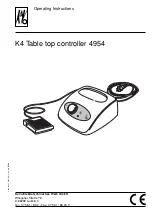
User Manual
7-16 Calibration Kit
60CK001-150 and 60CK010-150
60CK010-150
Rosenberger Hochfrequenztechnik GmbH & Co. KG
P.O.Box 1260 D-84526 Tittmoning Germany
www.rosenberger.com
Tel. : +49 8684 18-0
Email : [email protected]
Page
8 / 17
D
ie
s
e
s
D
o
k
u
m
e
n
t
is
t
u
rh
e
b
e
rr
e
c
h
tl
ic
h
g
e
s
c
h
ü
tz
t
●
T
h
is
d
o
c
u
m
e
n
t
is
p
ro
te
c
te
d
b
y
c
o
p
y
ri
g
h
t
●
R
o
s
e
n
b
e
rg
e
r
H
o
c
h
fr
e
q
u
e
n
z
te
c
h
n
ik
G
m
b
H
&
C
o
.
K
G
4. VNA Calibration
4.1 VNA Calibration
A VNA is only as useful as the accuracy of the measurements it makes, and this requires the
instrument to be calibrated. The calibration process employs a technique called vector error
correction, in which error terms are characterized using known standards so that errors can be
removed from actual measurements. The process of removing these errors requires the errors and
measured quantities to be measured vectorially (thus the need for a vector network analyzer).
Main setting parameters
:
It is good practice to start your measurement by selecting the main setting parameters.
•
Sweep type (linear / logarithmic)
•
Sweep range (start frequency / stop frequency)
•
Number of points (frequency step size)
•
Source power
•
IF bandwidth (small IF bandwidth basically increases the dynamic range)
•
Sweep time
Connect test port cables and adapters to your VNA as needed for your specific measurement task.
Calibration techniques
A very large number of calibration techniques have been developed to calibrate a VNA. The
following list describes calibration techniques you can apply with this calibration kit along with their
features and applicability for use in specific situations.
One-port calibration
OSL (OSM)
Open-Short-Load (Open-Short-Match)
When only reflection measurements are needed, the fastest and easiest calibration
technique is OSL. It requires 3 connections of calibration standards on the reference plane.
Two-port calibrations
OSLT (TOSM)
Open-Short-Load-Thru (Thru-Open-Short-Match)
OSLT is the most commonly used two-port calibration method. The Thru connections are
performed by using well-known, precision calibration adapters in male-male or female-female
configuration or as a direct connection of the male and the female test ports.



































